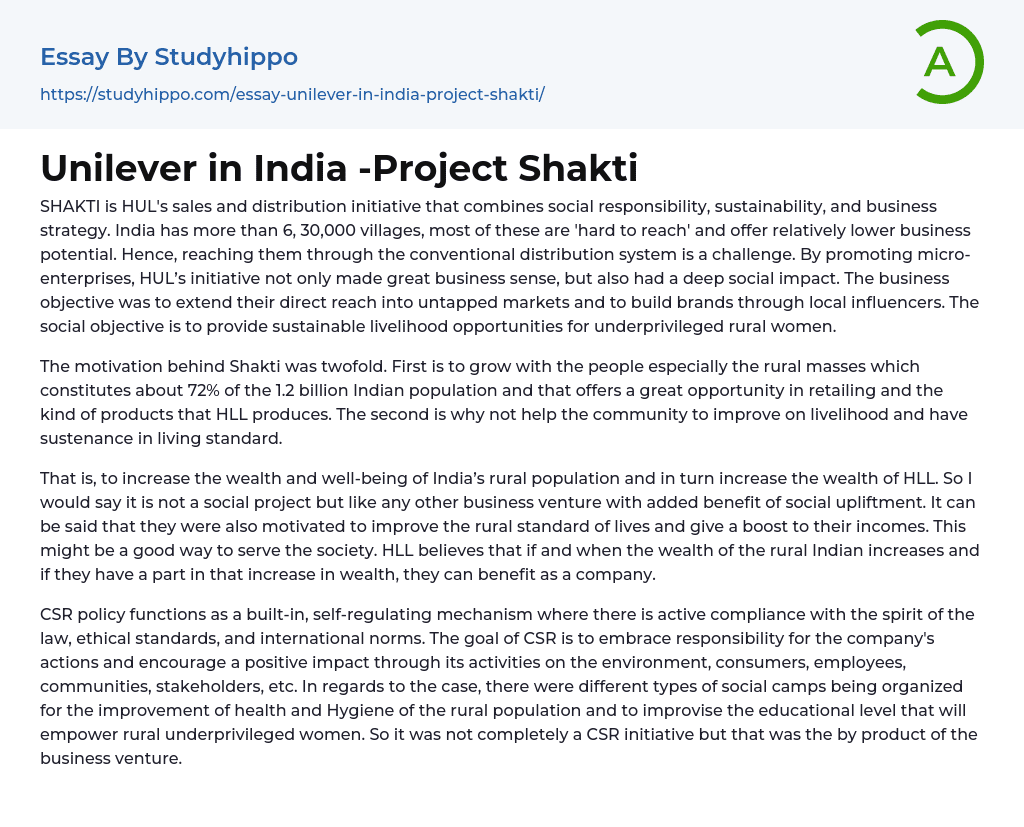SHAKTI is HUL's sales and distribution initiative that combines social responsibility, sustainability, and business strategy. India has more than 6, 30,000 villages, most of these are 'hard to reach' and offer relatively lower business potential. Hence, reaching them through the conventional distribution system is a challenge. By promoting micro-enterprises, HUL’s initiative not only made great business sense, but also had a deep social impact. The business objective was to extend their direct reach into untapped markets and to build brands through local influencers. The social objective is to provide sustainable livelihood opportunities for underprivileged rural women.
The motivation behind Shakti was twofold. First is to grow with the people especially the rural masses which constitutes about 72% of the 1.2 billion Indi
...an population and that offers a great opportunity in retailing and the kind of products that HLL produces. The second is why not help the community to improve on livelihood and have sustenance in living standard.
That is, to increase the wealth and well-being of India’s rural population and in turn increase the wealth of HLL. So I would say it is not a social project but like any other business venture with added benefit of social upliftment. It can be said that they were also motivated to improve the rural standard of lives and give a boost to their incomes. This might be a good way to serve the society. HLL believes that if and when the wealth of the rural Indian increases and if they have a part in that increase in wealth, they can benefit as a company.
CSR policy functions as a built-in, self-regulating mechanism
where there is active compliance with the spirit of the law, ethical standards, and international norms. The goal of CSR is to embrace responsibility for the company's actions and encourage a positive impact through its activities on the environment, consumers, employees, communities, stakeholders, etc. In regards to the case, there were different types of social camps being organized for the improvement of health and Hygiene of the rural population and to improvise the educational level that will empower rural underprivileged women. So it was not completely a CSR initiative but that was the by product of the business venture.
- Advertising essays
- Audience Theory essays
- Competitor Analysis essays
- Consumer essays
- Marketing Management essays
- Marketing Mix essays
- Marketing Plan essays
- Marketing Research essays
- Marketing Strategy essays
- Point Of Sale essays
- Price essays
- Procurement essays
- Product essays
- Product Differentiation essays
- Promotion essays
- Promotion And Marketing Communications essays
- Retailing essays
- Trademark essays
- Anheuser-busch essays
- Brands essays
- Detergent essays
- Product Placement essays
- Research Design essays
- New Product Development essays
- Advertisement essays
- Brand essays
- Sales Promotion essays
- Advertising campaign essays
- Consumer behaviour essays
- Offer And Acceptance essays
- Wal-Mart essays
- Discover essays
- Accounting essays
- Andrew Carnegie essays
- Automation essays
- Business Cycle essays
- Business Intelligence essays
- Business Model essays
- Business Operations essays
- Business Software essays
- Cooperation essays
- Cooperative essays
- Corporate Social Responsibility essays
- Corporation essays
- Customer Relationship Management essays
- Family Business essays
- Franchising essays
- Harvard Business School essays
- Harvard university essays
- Human Resource Management essays




